Technical writers play a crucial role in making complex information more accessible and understandable. They translate intricate technical details into clear and concise documentation that can be used by various audiences, from developers to end-users.
Technical writing skills encompass a mastery of language and grammar, a solid understanding of technical subjects, and the ability to communicate effectively with different stakeholders. These skills must be assessed not just by looking at writing samples, but also through practical tests and interviews that evaluate their ability to learn and explain technical concepts.
Candidates can write these abilities in their resumes, but you can’t verify them without on-the-job Technical Writer skill tests.
In this post, we will explore 8 essential Technical Writer skills, 8 secondary skills and how to assess them so you can make informed hiring decisions.
Table of contents
8 fundamental Technical Writer skills and traits
The best skills for Technical Writers include Clarity in Writing, Understanding the Audience, Technical Knowledge, Research Skills, Attention to Detail, Proficiency in Tools, Collaboration and User Experience Focus.
Let’s dive into the details by examining the 8 essential skills of a Technical Writer.
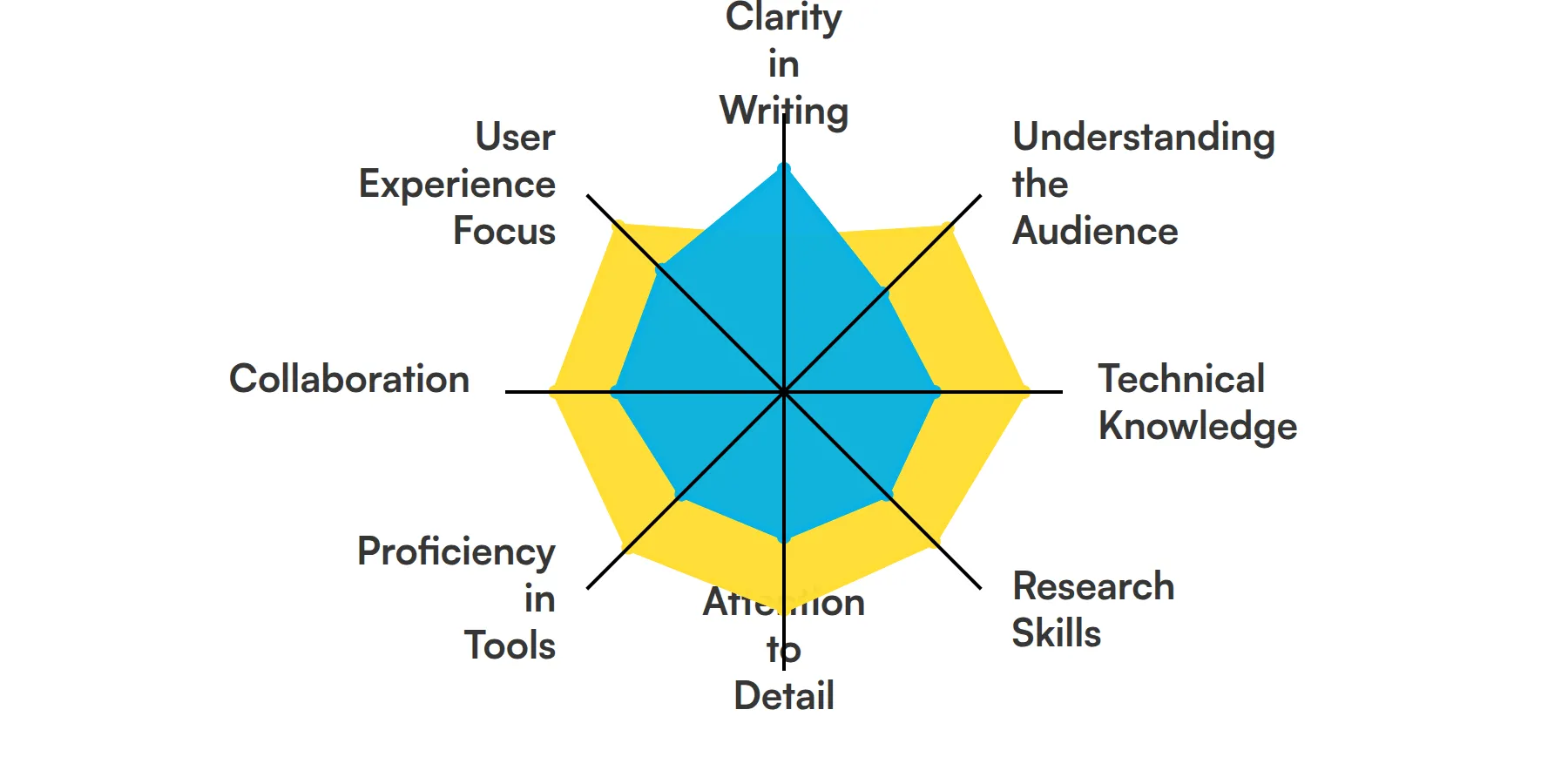
Clarity in Writing
A technical writer must excel at producing clear and concise documentation. Their role often involves explaining complex technical information in a way that is easy to understand for users or developers, ensuring that the message is not lost in translation.
For more insights, check out our guide to writing a Content Writer Job Description.
Understanding the Audience
Knowing the audience is critical for a technical writer. This skill involves tailoring the content to suit the knowledge level and needs of the reader, ensuring that the documentation is relevant and accessible to its intended users.
Technical Knowledge
A sound understanding of technical concepts is essential for a technical writer. While they may not need to be deep experts, familiarity with the subject matter enables them to translate complex ideas into user-friendly documentation.
Check out our guide for a comprehensive list of interview questions.
Research Skills
Research is a pivotal aspect of writing technical documents. A technical writer often gathers information from experts and other resources, validating and synthesizing data to produce accurate and relevant content.
Attention to Detail
Technical writing requires a meticulous eye for detail to ensure accuracy and consistency in documentation. This includes checking for grammatical errors, ensuring precise terminology, and maintaining style consistency.
Proficiency in Tools
Familiarity with technical writing tools, such as document processors, content management systems, and collaboration platforms, is important. These tools help in organizing, editing, and publishing content efficiently.
For more insights, check out our guide to writing a Software Tester Job Description.
Collaboration
Technical writers often work with cross-functional teams, including developers, product managers, and designers. Effective collaboration ensures that the documentation is comprehensive and aligns with other project deliverables.
User Experience Focus
A strong focus on user experience helps technical writers create documentation that is not only informative but also intuitive and engaging for the end-users. This involves structuring content and using visuals to enhance comprehension.
Check out our guide for a comprehensive list of interview questions.
8 secondary Technical Writer skills and traits
The best skills for Technical Writers include Time Management, Adaptability, Graphic Design Basics, SEO Knowledge, Version Control, Basic Coding Skills, Feedback Integration and Interpersonal Skills.
Let’s dive into the details by examining the 8 secondary skills of a Technical Writer.
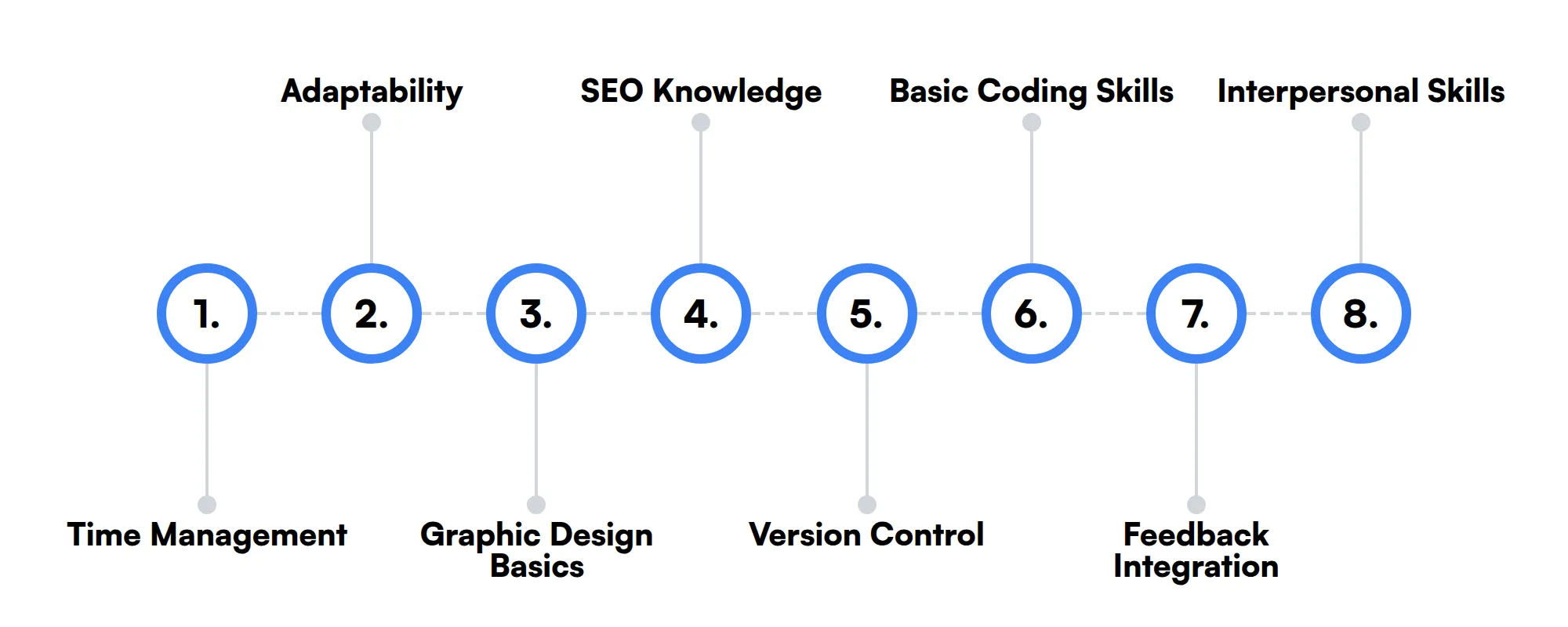
Time Management
Technical writers often juggle multiple projects, requiring the ability to prioritize tasks and meet deadlines. Good time management skills ensure that documentation is delivered on schedule without sacrificing quality.
Adaptability
The landscape of technology constantly changes, and technical writers need to adapt quickly to new tools, technologies, and methodologies to stay relevant and effective in their role.
Graphic Design Basics
While not always mandatory, basic graphic design skills can be helpful for a technical writer to create diagrams, screenshots, and other visuals that complement written content and enhance understanding.
SEO Knowledge
Understanding SEO can improve the visibility of online documentation. By incorporating relevant keywords and structuring content effectively, technical writers can help users find necessary information more easily.
Version Control
Familiarity with version control systems like Git can help technical writers manage and track changes in documentation projects, especially in teams following agile methodologies.
Basic Coding Skills
Having a basic understanding of coding can be beneficial for a technical writer, especially in tech-heavy environments where it aids in better understanding and explaining APIs or software manuals.
Feedback Integration
The ability to incorporate feedback from peers, subject matter experts, and users is a valuable skill. It helps refine and improve the quality of the documentation produced by technical writers.
Interpersonal Skills
Although not a primary focus, interpersonal skills play a role in gathering information and communicating with team members and stakeholders effectively, aiding in the creation of comprehensive documentation.
How to assess Technical Writer skills and traits
Assessing the skills and traits of a Technical Writer goes beyond simply evaluating their ability to string together well-formed sentences. With a blend of writing prowess and technical understanding, coupled with a strong sense of audience awareness and attention to detail, Technical Writers possess a unique skill set that can only be accurately measured through comprehensive talent assessments. These assessments highlight how effectively a candidate can synthesize complex information and present it with clarity.
Adaface offers a range of on-the-job skill tests that can be tailored to evaluate these competencies in detail. By implementing such tests, you can achieve a 2x improved quality of hires and an 85% reduction in screening time. Check out Adaface assessments to streamline your hiring process, ensuring you find Technical Writers who excel not just in theory, but in practice as well.
Let’s look at how to assess Technical Writer skills with these 4 talent assessments.
English Comprehension Test
Our English Comprehension Test evaluates a candidate’s ability to understand and communicate in business-level English. It focuses on assessing skills needed to comprehend textual information, deduce insights from presented facts, and express ideas clearly.
The test measures understanding in areas like reading comprehension, inferencing, attention to detail, grammar, and vocabulary. It includes sections on listening comprehension and verbal reasoning, helping identify candidates with a strong command over the English language.
Candidates who perform well demonstrate strong reading and writing skills, an ability to draw logical conclusions, and express information clearly and concisely.
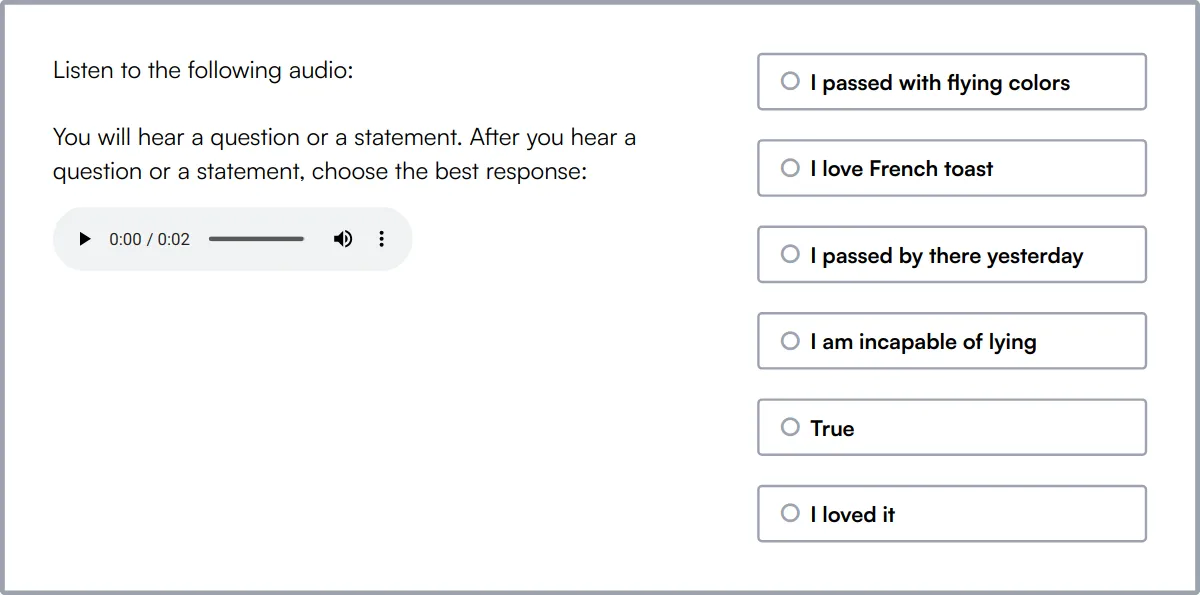
UX Writing Assessment Test
Our UX Writing Assessment Test evaluates a candidate's ability to create user-friendly and concise content for digital interfaces. It covers key UX writing areas, ensuring candidates can craft effective communication within a digital product setting.
This assessment checks skills in microcopy, information architecture, voice and tone, and accessibility. Scenario-based questions explore competence in engaging users through clear and strategic content, including error messages, call-to-action elements, and localization concerns.
High scorers are proficient in UX research methods and usability testing, and they understand brand guidelines and consistency to create coherent and appealing content.
Technical Writing Test
Our Technical Writing Test measures a candidate's skills in creating effective technical documentation, ensuring clarity and conciseness for target audiences. This evaluation is designed to assess writing techniques and adherence to documentation standards.
The test covers verbal reasoning, critical thinking, and editing and proofreading skills. Candidates navigate scenarios that require audience analysis and writing for different platforms, emphasizing their ability to create structured, clear documentation.
Successful candidates are adept at research and information gathering, with a strong command of formatting and style guides, demonstrating an ability to tailor communications effectively to diverse audiences.
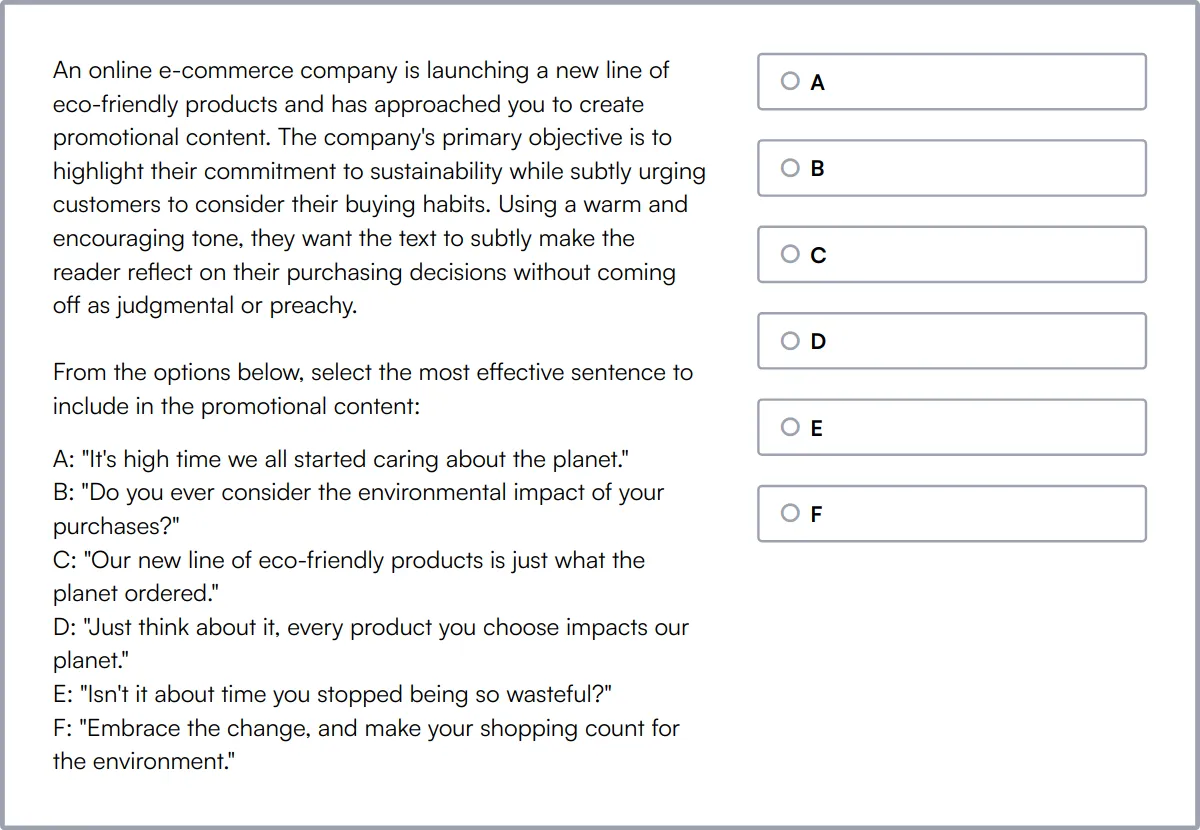
Attention To Detail Test
Our Attention to Detail Test evaluates a candidate's accuracy and thoroughness in processing information. It identifies those who can maintain high quality work by closely examining consistency and correctness.
The test evaluates abilities such as following instructions, proof-reading, and identifying mistakes. Candidates navigate through questions that assess their attention span and capacity to detect errors and verify data.
Candidates scoring highly show expertise in maintaining quality by efficiently detecting and correcting even minute discrepancies.
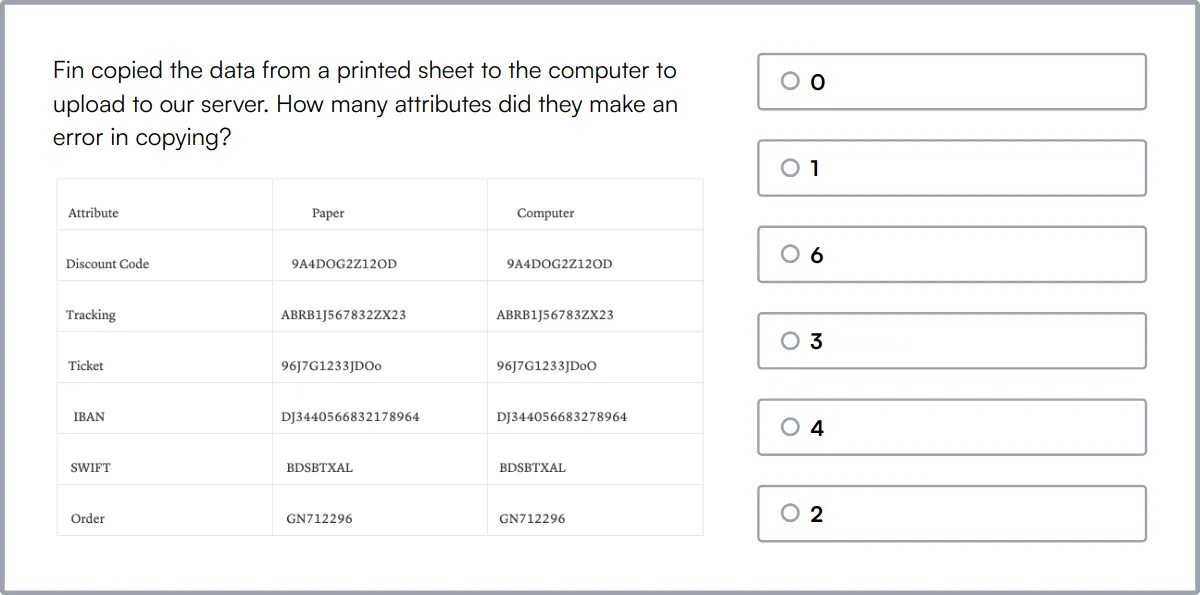
Summary: The 8 key Technical Writer skills and how to test for them
| Technical Writer skill | How to assess them |
|---|---|
| 1. Clarity in Writing | Evaluate clear, concise, and grammatically correct writing. |
| 2. Understanding the Audience | Assess ability to tailor content to audience needs. |
| 3. Technical Knowledge | Check grasp of relevant technical concepts and terminology. |
| 4. Research Skills | Determine skill in gathering and verifying information effectively. |
| 5. Attention to Detail | Observe precision in documenting specifications and instructions. |
| 6. Proficiency in Tools | Test familiarity with documentation and content creation tools. |
| 7. Collaboration | Evaluate aptitude for teamwork and effective communication with peers. |
| 8. User Experience Focus | Assess ability to design user-friendly and intuitive documentation. |
Technical Writing Test
Technical Writer skills FAQs
How can we assess a technical writer's ability to write with clarity?
Request writing samples or conduct a writing test. Focus on how well the writer conveys complex information simply and clearly. Look for grammar, coherence, and logical flow.
What techniques can be used to determine a candidate's understanding of their audience?
Discuss past projects and ask how they tailored content for different audiences. Evaluate their ability to modify tone and terminology based on audience needs.
Why is technical knowledge important, and how do we evaluate it?
Technical knowledge ensures accurate documentation. Assess it by discussing their prior experience, certifications, or asking them to explain complex technical concepts.
What is the best way to test a technical writer's research skills?
Give them a research assignment to evaluate their methodology. Review how they gather, verify, and present information relevant to the topic.
How do you identify a technical writer's proficiency in tools?
Ask about their experience with specific tools like MS Word, MadCap Flare, or Adobe Suite. Practical tests on these tools can further assess their skill levels.
What methods can be used to assess a candidate's attention to detail?
Provide a document containing deliberate errors in grammar, style, or logic. Evaluate how well they identify and correct these mistakes.
How can we evaluate a technical writer's collaboration skills?
Discuss past collaborative projects. Check for examples where they worked with SMEs, designers, or other writers, highlighting how they managed and communicated during teamwork.
In what ways does user experience focus enhance technical writing?
It ensures that documentation is intuitive and helpful for users. Evaluate by asking how they've incorporated user feedback to improve documentation or by testing the usability of their past work.

40 min skill tests.
No trick questions.
Accurate shortlisting.
We make it easy for you to find the best candidates in your pipeline with a 40 min skills test.
Try for freeRelated posts
Free resources



